10 MYTHS ABOUT MINIMALISM: WHAT YOU NEED TO KNOW INSTEAD
Minimalism is a popular movement for those who want to live a simpler, more intentional life, free from unnecessary clutter and distraction. Unfortunately, many misinterpret what a minimalist lifestyle really means. In this article I share 10 myths about minimalism and what I believe you need to know instead!
WHAT IS MINIMALISM?
Before we look at the myths about minimalism, I wanted to share this definition of minimalism from Joshua Becker of becomingminimalist.com.
It’s the best definition of minimalism I’ve come across so far and the one that resonated with me when I first began exploring a minimalist lifestyle for myself…
‘Minimalism is the intentional promotion of the things we most value and the removal of everything that distracts us from it.’
Joshua Becker
THE MINIMALIST LIFESTYLE AND DEFINING WHAT’S IMPORTANT
The minimalist lifestyle is about creating more space and time for what matters to you by deliberately focusing on what’s important and purposefully getting rid of excess clutter.
It doesn’t matter whether the clutter is physical stuff in your home, commitments in your schedule, too many credit cards in your purse or something that’s not actually a thing!
Clutter means different things to different people. Perhaps take a moment to consider what clutter is and what it means to you? Is it…
- Too many tasks on your To Do list?
- Too many unused toys in the toy box?
- Too many unread emails in your inbox?
- Too many apps on your phone?
- Too many activities in your schedule?
The idea of intentionally and purposefully prioritising what matters over what doesn’t is at the heart of what I believe the minimalist lifestyle is all about. Not what some of the myths of minimalism you’ll read about in a moment often have us believe.
GENTLE AND COMPASSIONATE MINIMALISM
Even though I write about minimalist living, sometimes I admit I find it an uncomfortable label. We’re so used to hearing the term defined in a negative sense – it’s a waste of money, it’s unrealistic, you can’t buy anything new, it’s boring, it’s extreme…
There are many minimalists who choose to live in tiny homes, with little furniture and less than 100 possessions. I’m not one of them and I don’t think I’d ever want to be. But I still consider myself a minimalist.
I have stuff in cupboards, an extra set of bed linen that I never use but have kept ‘just in case’. I have pictures on my walls and a whole lot of Lego that spills out from my daughter’s Lego box! But I still consider myself a minimalist.
The reason why I’m a minimalist is because I live by some clear guiding principles that help me make decisions every day about what matters in my life.
This may be anything from the utensils in my kitchen drawer to the mindsets and habits I try to cultivate daily.
- I have enough of things but not too much
- I spend money but spend it wisely
- I have stuff but I know where it is and what I have
- I know when I feel my home, heart or mind is cluttered and practice regular daily habits to keep this clutter at bay
- I say no sometimes and I’m ok with that
- I have space, ease and calm. When I feel that slipping, I pause, reflect and find it again
- I have a hoarder husband, a collector daughter, a bouncy dog and juggle work, family and this blog. My life is full, but intentional and yes, minimalist.
Creating space, defining what’s important and honouring that daily is, to me, what minimalist living is about. It’s far from the micro-managed, rigid and extreme minimalism that the label tends to evoke!
This is also the message that I try to share on this site.
I encourage you to explore a more minimalist lifestyle and adapt it to suit your life as it is now. Find your own version of minimalism. Let yourself be gentle, compassionate, mindful and heart-centred in your choices and decisions on what matters in life and you’ll feel the benefits so much more!
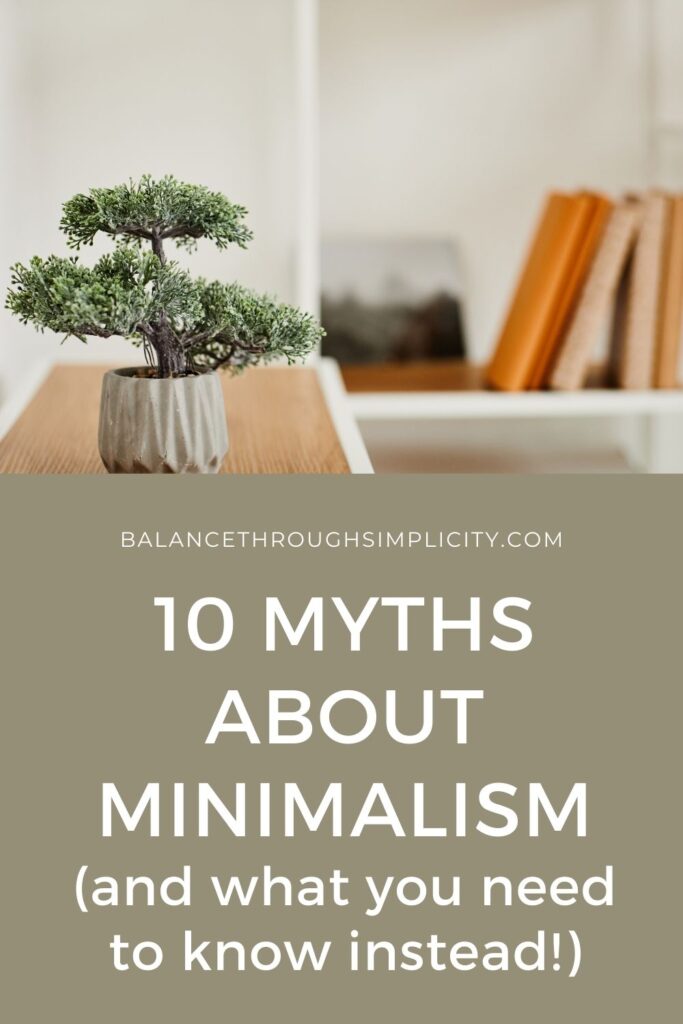
MYTHS ABOUT MINIMALISM AND WHAT YOU NEED TO KNOW INSTEAD
Minimalism often comes with misconceptions. We make assumptions around what we think it is which block us from giving it a go. Here are 10 myths about minimalism. I hope they help you to think a little differently about what a gentle, realistic minimalist lifestyle could really mean for you.
1. Minimalism is just about owning fewer things
While reducing physical possessions is often a part of minimalism, it’s not just about the material stuff in your home.
It’s also about simplifying life to focus on what’s truly important to you, whether that’s relationships, personal or spiritual growth, family, career, adventure, travel and memorable experiences, or something else entirely.
The first step many people take when exploring the minimalist lifestyle is to declutter their stuff. But, decluttering is just a tool to help you create time, space and freedom in your home and life.
Decluttering is not the end game and that’s why you’ll find plenty of articles on my blog about both decluttering and minimalism. They’re not the same thing!
Which leads me onto….
2. Minimalism is only about physical possessions
While decluttering physical possessions is a common starting point, minimalism can extend beyond that to other areas of life, such as digital clutter, time management, and even relationships.
It’s about simplifying and focusing on what truly adds value to your life. If you think back to how we defined minimalism at the start of this article, as the ‘intentional promotion of the things that matter’, I think most of us would agree that physical stuff doesn’t matter half as much as happiness, contentment, love and fulfilment.
We don’t find these in our kitchen drawers or garages filled with clutter, but we do find them when we curate a life that focuses on doing and having more of what matters and less of what doesn’t – in every respect.
Minimalism is a beautiful guiding principle for making the most of our precious life.
To give you an idea of how minimalism plays out in other areas of life, you might enjoy these articles on minimalism related to menopause, personal growth, introversion, money and finances and time management to name just a few article topics you’ll find on the blog.
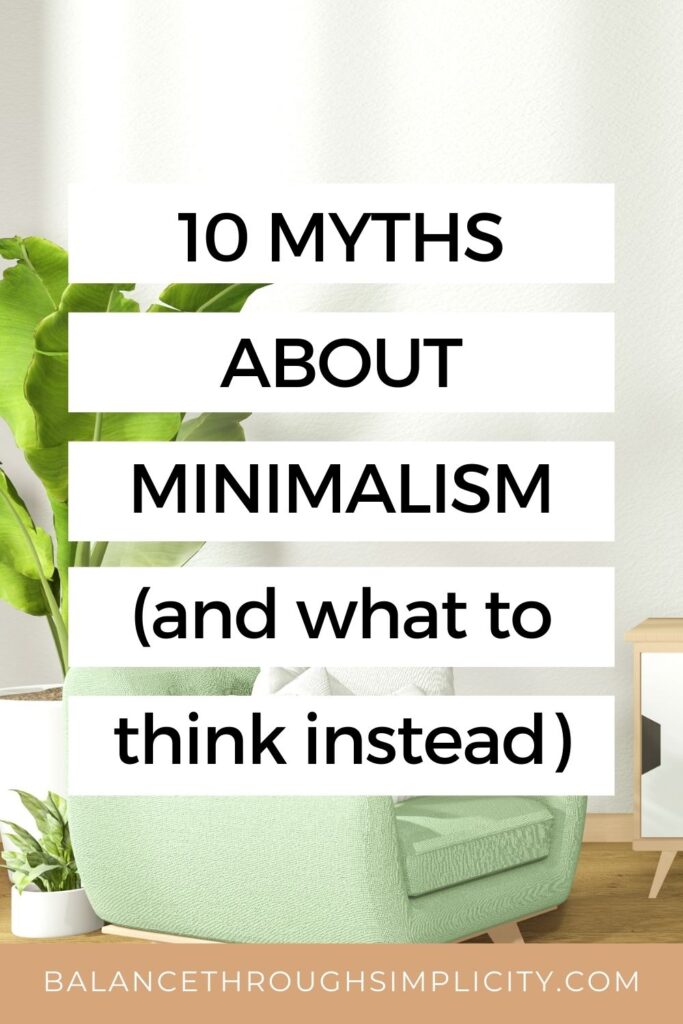
3. Minimalism is never going shopping
There are many times when I go shopping and plenty of minimalists who spend money. The difference is that, as Francine Jay says, ‘Minimalism is asking why before you buy’.
Is there a value or a purpose in what you’re wanting to buy? Value isn’t measured by price tag, quantity or practicality. If something speaks to your heart and you can honestly say your life will be better with that item, then perhaps it’s a worthy purchase.
When it comes with conflicting emotions, at the expense of something else or puts you in debt, then maybe re-think whether you really need that item.
Further reading: Minimalism and shopping
4. Minimalism means you count your possessions
There are some minimalists who do this and good on them! Personally, I haven’t got a clue how many things I own and it’s not really how I quantify how minimalist I am.
Minimalism is more than doing an inventory of your stuff but sometimes it can act as a helpful guide. For example, if I’ve got 7 pairs of jeans in my wardrobe, I know it’s time to sift through them.
Aside from that, numbers mean little to me and I’d rather focus on how my items make me feel (my clutter threshold) as a guide to whether I have too many.
5. Minimalism is for a certain type of person
I think I’d be much more minimalist if I lived on my own, without kids and toys, a hoarder husband and his DIY tools and the extra stuff that comes with a busy family life.
That said, my home has just what we need, not really much more or less. It suits our lifestyle, gives us flexibility and is somewhere we can all enjoy and love to be. I can tidy and clean easily enough and I don’t ever feel that we’re missing out on family life in our pursuit of a minimalist life. The total opposite in fact!
Minimalism can be for whoever needs it, especially when you remember that a minimalist life isn’t about less stuff, it’s about more life. And who doesn’t need a little bit more of what lifts us up and less of what brings us down?
Further reading: Minimalism and motherhood
6. Minimalism means perfection
I can’t deny that I like things neat and tidy but I certainly haven’t got rid of everything. If you peek inside some of my cupboards or drawers, you’ll even find them a bit messy or full of stuff.
Minimalism isn’t about perfection. It’s about real life, just with less stuff generally and more of a mindful eye on what you let in, into those drawers, your inbox, your garage, your home, heart and mind.
Tell me I have to go through all my cupboards and make them perfect so I can be a ‘true minimalist’ and I’ll tell you that I’d rather be out having fun with my family!
Minimalism is a guiding principle, not a case for perfection.
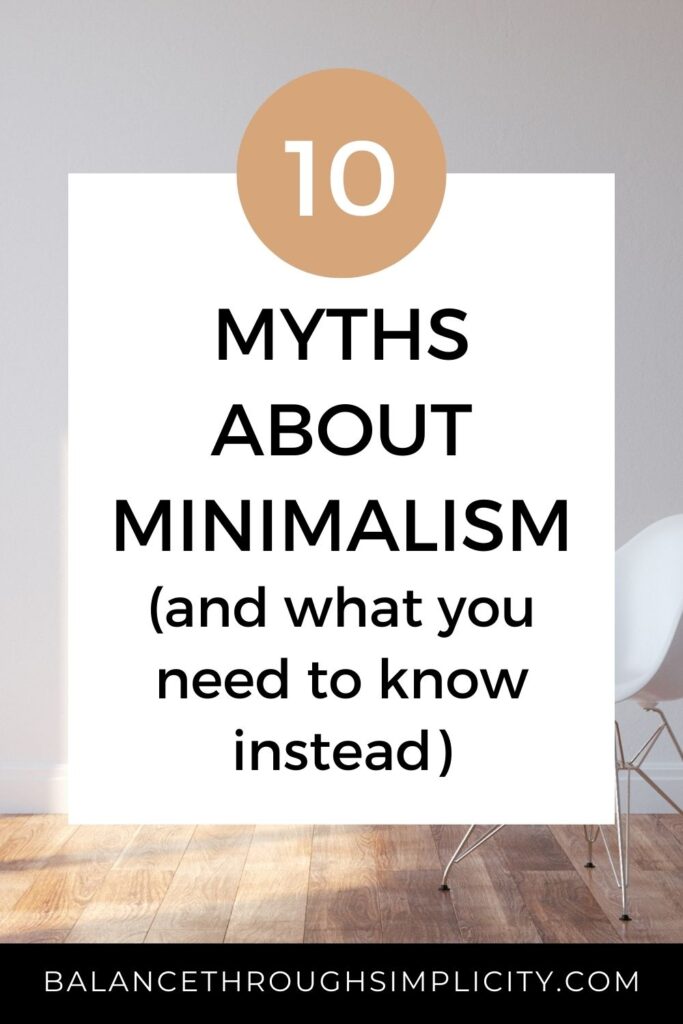
7. Minimalism means you get rid of all your stuff
So, now I’ve confessed that I have a bit too much stuff in one or two of my cupboards, I hope you’ve realised that minimalism isn’t about getting rid of your stuff. It can be if you want it to be, but if you don’t, that’s fine too.
Think of the minimalist lifestyle as a spectrum and find your own little comfortable place on that spectrum – it’s broad enough for everyone!
8. Minimalism is boring, empty and unemotional
Nothing could be further from the truth. I turned to minimalism because I wanted to be the opposite. I wanted a full, rich and happy life, not one that felt like I was trudging on a treadmill.
I was fed up of doing the same thing day after day. I wanted creativity, freedom, ease, joy, excitement, growth, learning, laughter whilst still bringing up my kids and paying my bills.
The solution for me was to stop following what everyone else was doing and try a new way. I cleared the clutter, created space and filled that space with so much more.
I still have my creature comforts and a minimalist family home that’s colourful and definitely not bland and boring. Less stuff gave me more life and was definitely not boring, empty or unemotional.
9. Minimalism is expensive
While some minimalist trends might involve purchasing high-end, long-lasting items, minimalism itself doesn’t have to be expensive. In fact, it often involves spending less by being intentional about purchases and avoiding unnecessary ones.
Although not always the case, I think there are many parallels between minimalism and frugal living. As a minimalist who wants to save money, I do try to watch the pennies, save more and spend money wisely with some mindful shopping habits.
10. Minimalism is easy
Whilst minimalism might seem a relatively easy concept, keep what matters and get rid of what doesn’t, for anyone who’s tried it I think they’d probably say it’s not quite so easy in practice as it is in theory!
Modern society often equates possessions with success and happiness and it’s quite counter-cultural to think differently. From caring what others may think to the highlight reels on our social media feeds, to the adverts that bombard us as we settle down to watch TV in the evening, life tells us we need more, bigger and better to be happy.
Minimalism isn’t easy. It requires introspection, discipline and ongoing effort to maintain a minimalist lifestyle, but I think it is most definitely worth it!
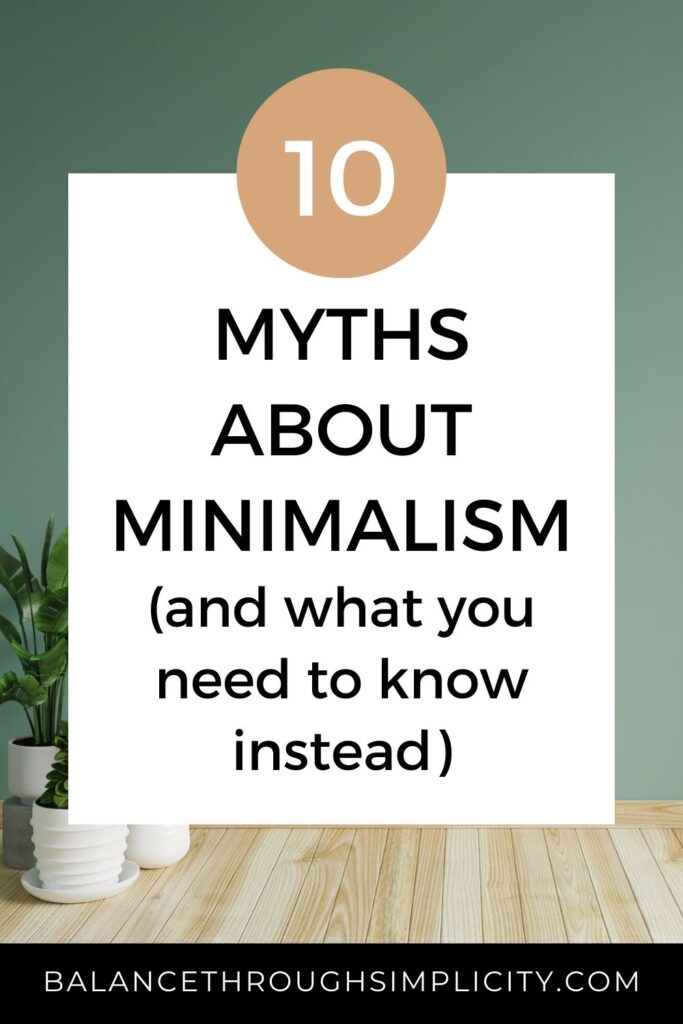
CONCLUSION
Minimalism is a wonderful, empowering lifestyle that enables you to focus intentionally on the most important things in life without the things that often clutter and distract.
Unfortunately, there are many myths and misconceptions on what it means to be minimalist that put people off from giving it a go and experiencing the benefits.
I hope this article has helped explain my approach to minimalism and why I believe there’s value for everyone in exploring minimalism for yourself.
Please do leave a comment below as I’d love to hear your thoughts!
GETTING STARTED WITH MINIMALISM
If you’d like to explore becoming minimalist in your own life, here are some helpful articles and resources. Remember that minimalism is a guiding principle not a strict set of criteria you have to meet!
- How to Become A Minimalist: 7 Ways to Start Today
- 18 Minimalist Lifestyle Tips: Embrace Minimalist Living Every Day
- What is Minimalism and a Few Things It’s Not
- The Minimalist Mindset: Thinking Like a Minimalist
- 9 Lessons I’ve Learned From Minimalism
DON’T MISS OUT!
I’m Antonia and on this blog I share practical inspiration to simplify your home, time and life. Follow me on Instagram, Facebook and Pinterest! You can also subscribe to Balance Through Simplicity and receive regular simplicity tips straight to your inbox for free. Make sure you never miss an article plus you’ll get a copy of my free Declutter Starter Kit as a welcome gift!

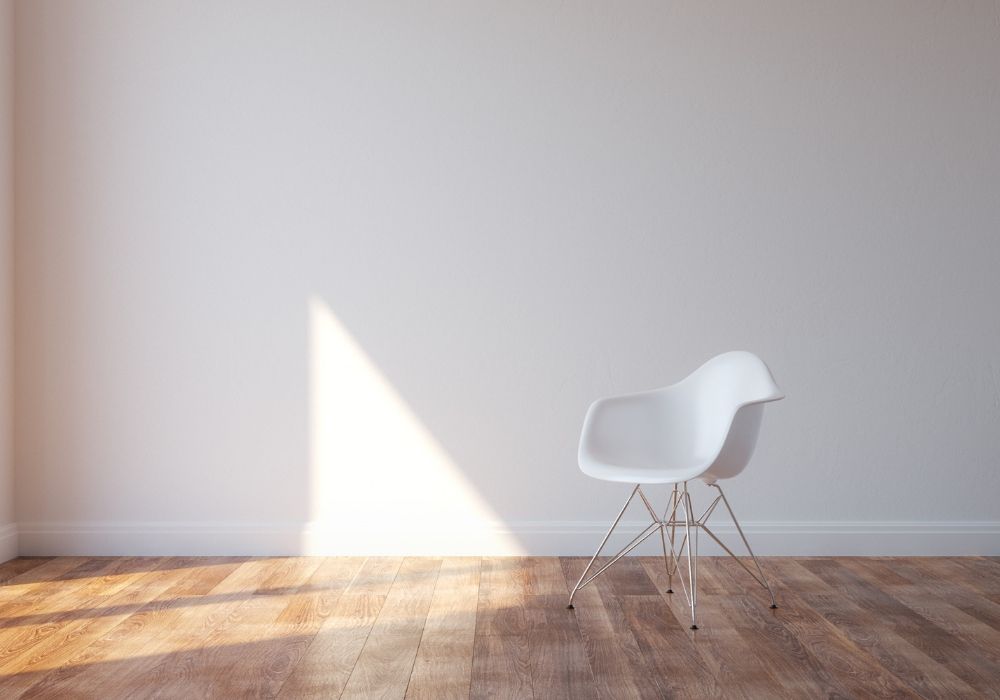
Dawn
Sunday 14th of April 2024
EXCELLENT article -- probably the best I've read about minimalism and decluttering. It really speaks to me and inspires me because it's about living intentionally in a way that you create time and space for what most matters to you. Thank you!
Balance Through Simplicity
Sunday 14th of April 2024
Hi Dawn, thank you so much for reading and for your comment. I absolutely agree, we often think about minimalism in terms of our stuff, but it is so much more wide-reaching than that. I'm glad you feel inspired!